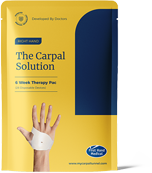Arthritis and Carpal Tunnel Treatment – Best Medical Practice
Arthritis makes Carpal Tunnel Symptoms worse and CTS makes Arthritis worse. So, when you put Carpal Tunnel in remission naturally, the progression of Arthritis slow down too. Also, when people with Arthritis have surgery, scar tissue can get out of control causing complications.


By The Carpal Solution Medical Team Over 300 years combined medical experience

Arthritis and Carpal Tunnel Treatment – Best Medical Practice
Arthritis makes Carpal Tunnel Symptoms worse and CTS makes Arthritis worse. So, when you put Carpal Tunnel in remission naturally, the progression of Arthritis slow down too. Also, when people with Arthritis have surgery, scar tissue can get out of control causing complications.


By The Carpal Solution Medical Team Over 300 years combined medical experience

Carpal Tunnel Question:
“If I have Arthritis, Is Carpal Tunnel Surgery A Good Option?
If Not, What is the Best Way to Treat Carpal Tunnel when I have both conditions?”
Benjamin – Houston, Texas
Carpal Tunnel Answer by Doctors
 Carpal Tunnel Surgery is a treatment option that should be weighed carefully before proceeding for anyone. This is because Patients report an overall Carpal Tunnel Surgery success rate of less than 60%. Also, Carpal Tunnel Syndrome (CTS) comes back even after a successful surgery for 85% of people within 6 months to 8 years. Second Surgeries have a lower success rate in the range of 35 – 45%. These rates are spread over patients of all types with all kinds of contributing factors.
Carpal Tunnel Surgery is a treatment option that should be weighed carefully before proceeding for anyone. This is because Patients report an overall Carpal Tunnel Surgery success rate of less than 60%. Also, Carpal Tunnel Syndrome (CTS) comes back even after a successful surgery for 85% of people within 6 months to 8 years. Second Surgeries have a lower success rate in the range of 35 – 45%. These rates are spread over patients of all types with all kinds of contributing factors.
However, when a person has arthritis of any kind, Carpal Tunnel Surgery is a questionable treatment option at best for CTS. This is due to the high potential for scar tissue formation post-surgery during the healing process. There are so many small bones in the hand and wrist all held carefully together and cushioned from one another with soft tissue.
Arthritic soft tissue when disturbed or cut generates significantly more scar tissue than normal soft tissue. This is one of the reasons success rates on Carpal Tunnel Surgical procedures are much lower for people with arthritis.
In fact, many patients with Arthritic conditions get worse after surgery due to the generation of excess scar tissue. In an already tight space, excessive scar tissue will constrict the space further in the Carpal Tunnel. Any scar tissue will create additional pressure on the median nerve, making Carpal Tunnel Symptoms even worse after surgery than it was before.
For these reasons most surgeons discourage arthritic patients from considering Surgery for Carpal Tunnel Syndrome altogether.
With Arthritis, CTS Symptoms Return Quicker even with a successful Surgery.

Often the Symptoms Get Worse After Surgery due to Scar Tissue.
Ironically, Arthritis is one of over 27 possible contributing factors that can contribute to Carpal Tunnel Syndrome.
You can learn more about contributing factors or Causes of Carpal Tunnel here.
There are several different types of Arthritis that can affect the area around the Hand and Wrist. The types most relevant to Carpal Tunnel Syndrome are listed below:
Avascular Necrosis in the Bones of the Wrist
– when the bone tissue is damaged, embrittled, fractured or actually dies due to restricted blood flow to the bone. Since most people with CTS always have restricted blood flow to the hand, wrist and forearm this is a condition of which one should be acutely aware if CTS has gone untreated for many years. Usually, prior trauma from a fall or accident combines with restricted blood flow from CTS or some other condition to contributing to an Avascular Necrosis condition. Swelling of the Carpal Bones from this condition can actually contribute to CTS. So, these two conditions can be cyclical one contributing to the other.
Rheumatoid Arthritis
– This is an autoimmune disorder that will also contribute to Carpal Tunnel Syndrome. It is a chronic condition that over time will lead to bone and joint deformation. It affects the joint lining and causes the joints to swell. It can contribute to Carpal Tunnel through swelling as well as through formation of scar tissue and deformation of the bone with rheumatoid nodules or bumps.
Osteoarthritis
– This is the classic arthritic condition associated with wear and tear – repeated minor trauma (repetitive stress) over and over again throughout a life time. It usually begins in people over 50 years of age.
Post-Traumatic Arthritis
– This is caused by a prior traumatic injury which can lead to joint instability and damage to the soft tissue around the joints. There are so many small bones in the hand and wrist that there is an ample opportunity for injury to the soft tissue that cushions these joints and holds them in place
If you’re over 50 and have a family history of Arthritis or have other reason to believe you might have an arthritic condition, you should check with a rheumatologist for an evaluation and diagnosis.
 Everyone with CTS should seek clinically documented, non-invasive Carpal Tunnel Treatment and consider Carpal Tunnel Surgery a last resort.
Everyone with CTS should seek clinically documented, non-invasive Carpal Tunnel Treatment and consider Carpal Tunnel Surgery a last resort.
However, if you are found to have any kind of arthritis, then this approach becomes essential. Undergoing this surgery with an arthritic condition would be considered by most medical professionals as highly questionable and only justified in extreme situations.
So, what can be done if you have Carpal Tunnel Syndrome and Arthritis?
The best place to start is using a Carpal Tunnel Treatment option that restores full blood circulation and returns flexibility to the injured soft tissue. Full blood circulation promotes naturally healing and is good for arthritic tissue as well as removing swelling fluids in the Carpal Tunnel.
One of the best options for you to consider is the Carpal Solution Therapy. It was developed by Doctors working with patients and provides gentle targeted stretching of the soft tissue around the Carpal Tunnel during sleep. Most people get relief of their worst symptoms within 3 weeks and complete remission within Six Weeks.
For People with Arthritis sometimes it can take longer than the Six Weeks because the symptoms are what the doctors call “more persistent”. However, it is still the best treatment options for people suffering with CTS that also have arthritis. The issue is Arthritis keeps bringing it back even after it is successfully treated. Restoring blood flow to the injured tissue is a key to alleviating CTS Symptoms and slowing the advances of arthritis. The thermal images below demonstrate how the Carpal Solution Therapy immediately jump starts the healing process.
Diet can play a big role in managing inflammation at the source, and inflammation drives arthritis and most other chronic diseases including Carpal Tunnel Syndrome. The Carpal Solution Diet will provide you with the direction would likely help you minimize the impact of inflammation on Arthritis, Carpal Tunnel Syndrome and improve your overall health. Turmeric is an additive that can help the lymph system to draw out toxins and inflammation from injured soft tissue. Learn more about Turmeric Supplements.
 The picture on the right is a Thermal Imaging Picture. Where pink represents normal skin temperature, yellow below normal skin temperature and blue represents cold skin temperature.
The picture on the right is a Thermal Imaging Picture. Where pink represents normal skin temperature, yellow below normal skin temperature and blue represents cold skin temperature.
It shows blood circulation is significantly restored within 15 minutes of putting on the Carpal Solution Soft Tissue Stretching Therapy.
With the Carpal Solution Six Week Therapy Pac, you are able to apply 224 hours of gentle targeted stretching to the soft tissue around the Carpal Tunnel while you sleep.
If that much circulation is restored in 15 minutes, imagine the impact of the stretching therapy over 6 weeks for 8 hours each night during sleep
People with Arthritis and CTS usually have more persistent symptoms.
They often have to use the Carpal Solution Devices on the maintenance schedule 2 – 4 nights per month once they have completed the Six Week Protocol developed by the Doctors.
It is worth the extra effort for people with Arthritis andCTS to avoid the downtime, risks and frequent complications of Carpal Tunnel Surgery.
Patients Report that wearing the Carpal Solution also relieves Arthritic Pain.
Neurologists Say The Carpal Solution Therapy Is the Best First Line Treatment for Carpal Tunnel Syndrome for all CTS Sufferers.
It is perhaps the only viable treatment for those who also have Arthritis.

 Created by renowned Harvard health care professionals.
Created by renowned Harvard health care professionals. 



